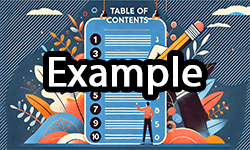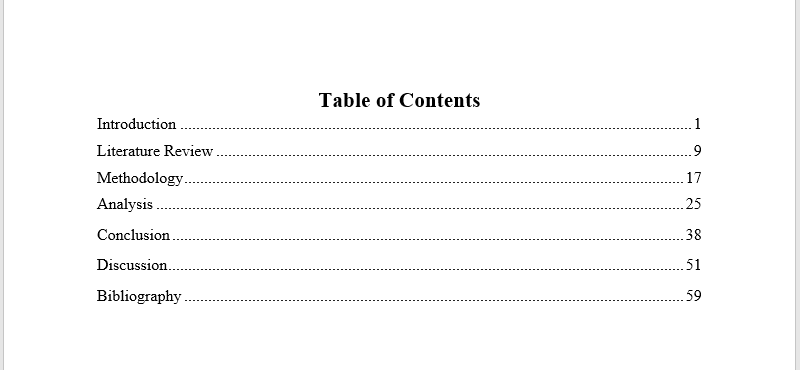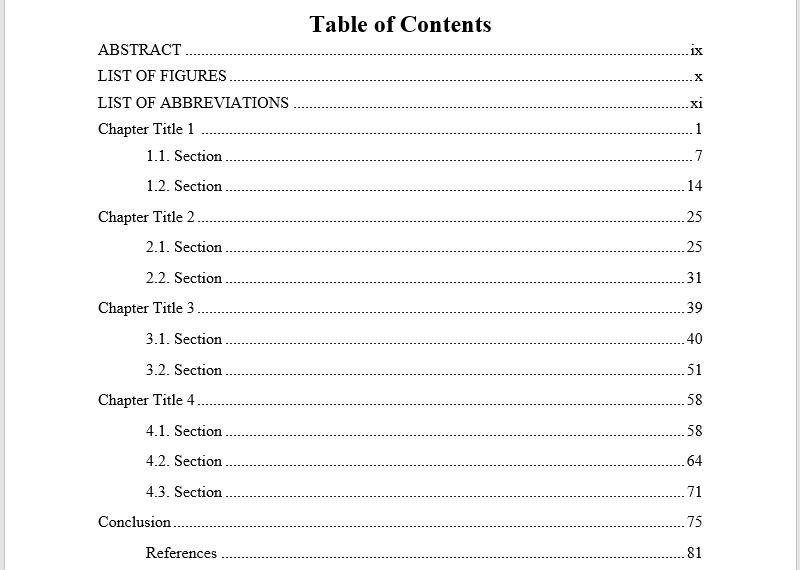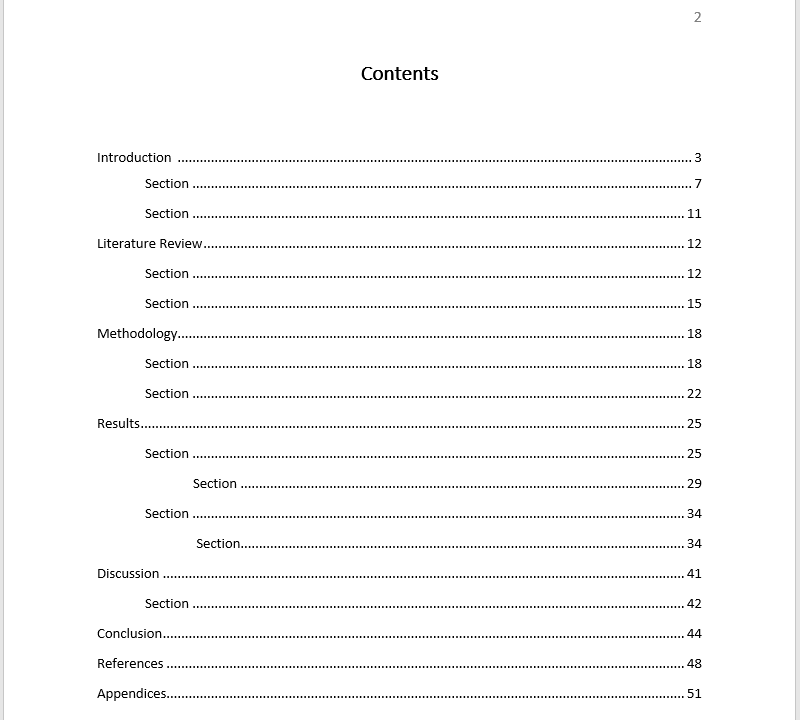
A table of contents, also known as TOC or Contents, is a vital component of any research paper, guiding readers through the intricate structure of the manuscript. By providing an organized listing of chapters and sections with accurate page numbers, a well-TOC enhances readability and ensures that readers can easily navigate the document, grasping the flow of your research. In this article, we offer numerous table of contents examples and templates for academic submissions and other functions.
Table of contents examples
Below, you can find numerous free, downloadable TOC example templates that you can utilize.
Single-level table of contents
For shorter documents, a single level table of contents example can be used. This is a short and succinct table of contents example which utilizes only single-level entries on sections or chapters. Remember, you’ll need to include properly formatted dots to lead the reader’s eye to the page number on the far right. The following table of contents example, available as PDF and Word document, explores this basic structure:
numerous advantages for Canadian students:
- ✓ 3D live preview of your configuration
- ✓ Free express delivery for every order
- ✓ High-quality bindings with individual embossing

Subdivided table of contents
A subdivided table of contents is required for more lengthy papers, offering a subdivision of sections within chapters. These are more detailed and are recommended for higher-level dissertations like a master’s or a bachelor’s thesis.
When formatting a subdivided table of contents, ensure that chapters are listed in bold font whereas that subsections are not. It’s common to denote each subsection by a number (1.1, etc.). You’ll also want to indent the subsections so that they can be read easily. The following table of contents example explores this structure:
Multi-level table of contents
Adding additional levels to your table of contents is known as a multi-level table of contents. These would be numbered 1.1.1 and onwards. Be aware that while you want to guide your reader through your manuscript, you should only highlight important areas of your manuscript, like sections and subsections, rather than random areas or thoughts in your manuscript. Creating too many levels will make your table of contents unnecessarily busy and too complex. We have provided a multi-level table of contents example for you below.
Table of contents example: Bachelor’s thesis
A bachelor’s degree thesis has no set word or page limit, and will depend entirely on your university’s or department’s guidelines. However, you should expect a thesis under 60 pages to be between 10,000 and 15,000 words long.
As such, you won’t be expected to produce a long and detailed table of contents with multiple levels and subsections. This is because your main body is rather limited in terms of word count. At most, you may find yourself using a subdivided table of contents similar to the table of contents example above. A TOC for a bachelor’s thesis can look like the following example:

Table of contents example: Master’s thesis
A master’s table of contents is more complex than a bachelor’s thesis. This is because they average at about 80 pages with up to 40,000 words. Because this work is produced at a higher academic level, it normally includes a subdivision of chapters and subheadings, with a separate introduction and conclusion, as well as an abstract, which should be one paragraph long. We have a helpful article for you if you want to know how to shorten an abstract.
A table of contents example for a master’s thesis may look something like this:

Table of contents example: APA
Academic papers in fields of anthropology, sociology, psychology, and other social sciences use the APA style format. Generally, APA guidelines do not require a table of contents; however, if you do provide one for a better reading experience, there is a format you should adhere to. Below, we have provided you with a table of contents example for APA.

Table of contents example: PowerPoint
FAQs
For an academic paper, the order is as follows:
- Title page
- Copy page
- Abstract
- Acknowledgements
- Table of contents with page numbers
- List of tables, figures, or illustrations (if relevant)
- List of abbreviations (if relevant)
- List of symbols (if relevant)
- Chapters
- Appendices (if relevant)
- Endnotes (if relevant)
- References
Yes, the references are included in TOCs, as you can see from our TOC examples. However, the acknowledgement for thesis and the abstract are usually not included. It is imperative to check with your institution if it is required to follow this format.
The table of contents can be displayed in the following formats:
- Single level table of contents
- Subdivided table of contents
- Multi-level table of contents
- Academic table of contents
The table of contents can be displayed in the following formats:
- Single level table of contents
- Subdivided table of contents
- Multi-level table of contents
- Academic table of contents
